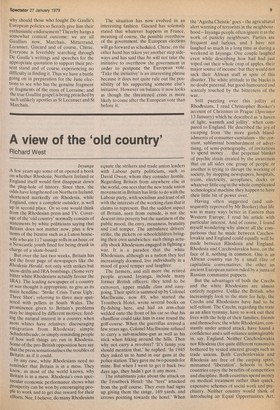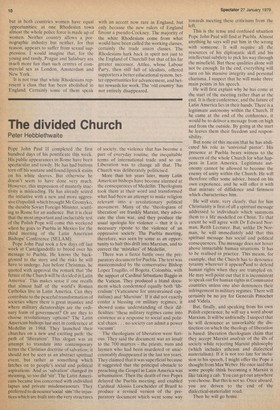A view of the 'old country'
Richard West
Inyanga A few years ago some of us opened a book on whether Rhodesia, Northern Ireland or England itself would first disappear down the plug-hole of history. Since then, the Odds have lengthened on Northern Ireland, shortened markedly on Rhodesia, while England, once a complete outsider, is well Up in second place. Or so one would think from the Rhodesian press and TV. Coverage of the 'old country' normally consists of statements by white politicians saying that Britain does not matter now, plus a few items of the bizarre such as a Luton housewife who ate 117 sausage rolls in an hour, or a Newcastle youth fined for being drunk in charge of a skate-board.
But over the last two weeks, Britain has led the front page of newspapers like the Rhodesia Herald, not only with strikes but snow-drifts and IRA bombings. (Some very bitter white Rhodesians actually favour the IRA). The leading newspaper of a country at war thought it appropriate, to give as its main headline: 'Strike Crisis Turns Ugly: Three Shot', referring to three men spattered with pellets in South Wales. The prominence given to Britain's problems may be inspired by different motives: feeding the natural interest in a country when most whites have relatives: discouraging emigration from Rhodesia; simple Schadenfreude; or simply reminding people of how well things are run in Rhodesia. Some of the pro-British opposition here say that the press sensationalises the troubles of Britain: as if it could.
In any case, white Rhodesians need no reminder that Britain is in a mess. They know, as most of the world knows, why Britain is in a mess. Rhodesia's own spectacular economic performance shows what Prosperity can be won by encouraging people to work and to get due reward for their efforts. Nor, I believe, do many Rhodesians equate the strikers and trade union leaders with Labour party politicians, such as David Owen, whom they consider hostile. Regarding Britain from anywhere else in the world, one sees that the new trade union movement in Britain has little to do with the Labour party, with socialism and least of all with the interests of the working class that it claims to represent. But the saddest aspect of Britain, seen from outside, is not the descent into poverty but the nastiness of the public mood, the envy, meanness, brutality and bad temper. The ambulance drivers' strike, the pickets on schoolchildren bringing their own sandwiches: such things actually shock Rhodesians engaged in fighting a war. It is a paradox that the white Rhodesians, although as a nation they feel increasingly doomed, live individually in a mood of good temper and laughter.
The farmers, and still more the retired people around Inyanga, include many former British officers: they tend to be extrovert, upper middle class and easygoing. Their spirit is summed up by Colonel MacIlwaine, now 89, who started the Troutbeck Hotel, wrote several books on fly-fishing here, and had an arm-chair welded onto the front of his car so that his chauffeur could take him in ease round the golf-course. When the guerrillas arrived a few years ago, Colonel MacIlwaine refused to carry a sub-machine-gun as well as his stick when hiking around the hills. Then why not carry a revolver? 'It's funny you should mention that,' he replied. 'In 1945 they asked us to hand in our guns at the police station. They gave me two pounds for mine. But when I went to get it back two days ago, they hadn't got it any more.' The inhabitants joke about the attack on the Troutbeck Hotel: 'the "ters" attacked from the golf course. They even had signs up giving them the range, 169 yards, and arrows pointing towards the hotel.' When the 'Agatha Christie' goes—the agricultural alert warning of terrorists in the neighbourhood — Inyanga people often ignore it as the work of panicky neighbours. Parties are frequent and furious, and I have not laughed so much in a long time as during a weekend in Inyanga. One couple laughed even while describing how hail had just wiped out their v;hole crop of apples, their major source of income: but they would not sack their African staff in spite of this disaster. The white attitude to the blacks is no doubt paternal, but good-humoured and scarcely touched by the bitterness of the war.
Still puzzling over this jollity of Rhodesians, I read Christopher Booker's account of Christmas in Prague (Spectator 13 January) which he described as 'a haven of light, warmth and jollity', when compared to England. He described the joy of escaping from 'the more garish blandishments of consumer-capitalism — the constant, subliminal bombardment of advertising, of semi-pornography, of invitations to spend money . . . that perpetual blanket of psychic strain created by the awareness that on all sides one group of people or another is trying to disrupt the working of society, by stopping newspapers, hospitals, trains, electricity, aeroplanes, docks or whatever little cog in the whole complicated technological machine they happen to have their little bit of power over.'
Having often suggested (and subsequently reproved by Mr Booker) that life was in many ways better in Eastern than Western Europe, I read his article with particular interest. And of course, I found myself wondering why almost all the comparisons that he made between Czechoslovakia and England could equally well be made between Rhodesia and England. Rhodesia and Czechoslavakia have, on the face of it, nothing in common. One is an African country run by a small elite of capitalistic conversatives; the other an ancient European nation ruled by a junta of Russian communist puppets.
But the advantages of both the Czechs and the white Rhodesians are almost entirely negative. Unlike the British, who increasingly look to the state for help, the Czechs and Rhodesians have had to be self-reliant. The Czechs, regarding the state as an alien tyranny, have to work out their lives with the help of their families, friends and themselves; the white Rhodesians, constantly under armed attack, have found a ,confidence and a self-reliance unimaginable in, say, England. Neither Czechoslovakia nor Rhodesia (for quite different reasons) is bothered by vested interest groups such as trade unions. Both Czechoslovakia and Rhodesia are free of the carping spirit, misnamed 'liberation'. Schools in both countries enjoy the benefits of competition and discipline. Both countries spend money on medical treatment rather than quack, expensive schemes of social work and psychiatry. Neither country would think of introducing an Equal Opportunities Act, but in both countries women have equal opportunities: at one Rhodesian town almost the whole police force is made up of women. Neither country allows a pornographic industry but neither, for that reason, appears to suffer from sexual suppression. I would imagine that, for the young and randy, Prague and Salisbury are much more fun than such centres of commercial sex as London, Amsterdam and New York.
It is not true that white Rhodesians represent a class that has been abolished in England. Certainly some of them speak with an accent now rare in England, but only because the new rulers of England favour a pseudo-Cockney. The majority of the white Rhodesians come from what would have been called the working classes, certainly the trade union classes. The Rhodesians hark back in spirit not just to the England of Churchill but that of his far greater successor, Attlee, whose Labour Party, then still full of idealists, offered supporters a better educational system, better opportunities for advancement, and better rewards for work. The 'old country' has not entirely disappeared.







































 Previous page
Previous page